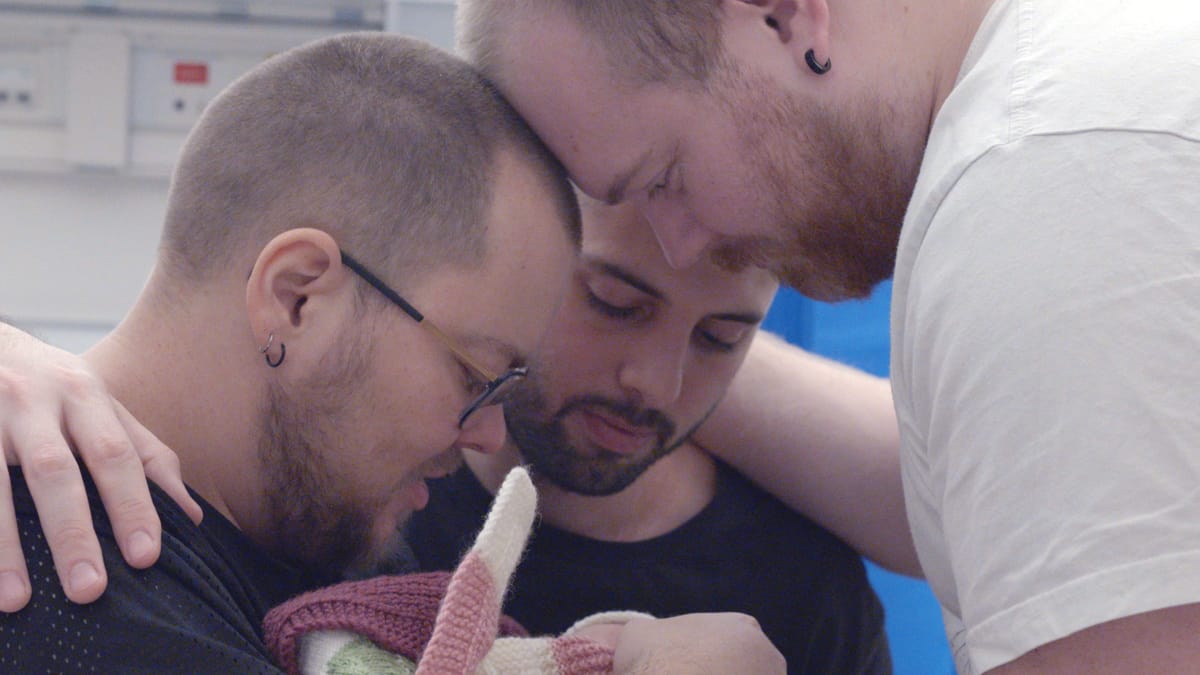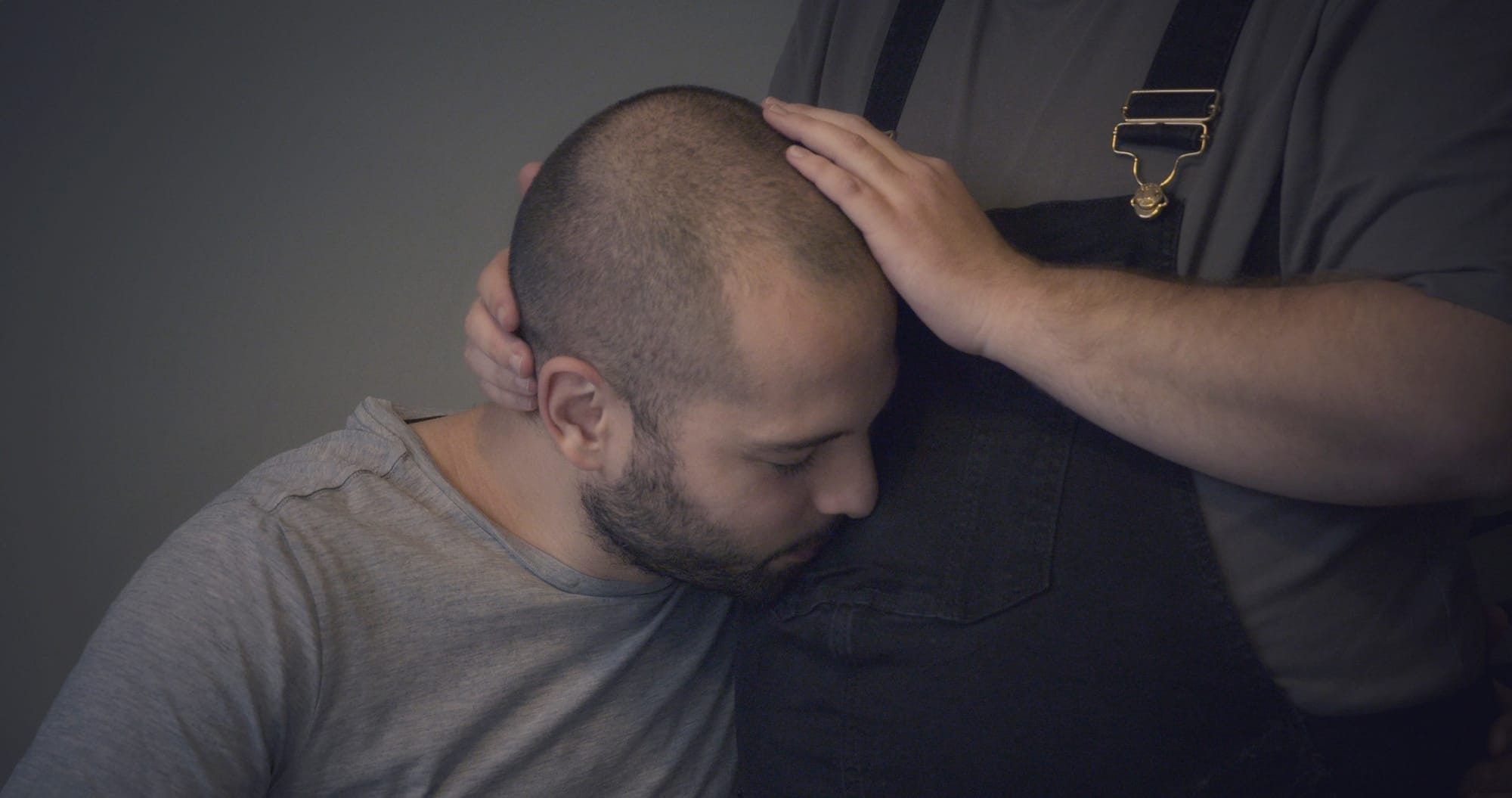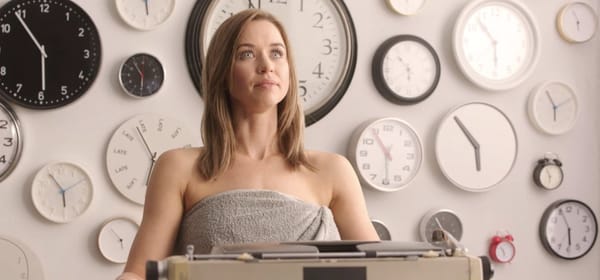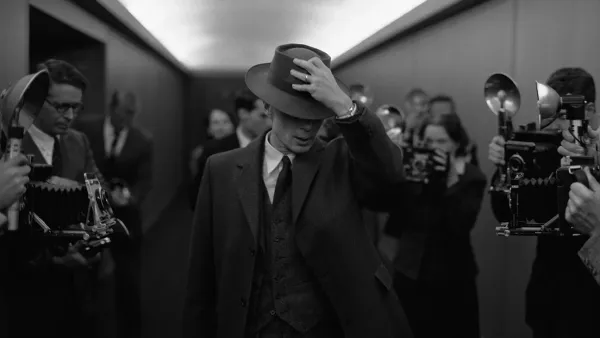Fatherhood
A warm, intimate documentary that puts its faith in humanity

Kris, a trans man living in rural Norway with his two partners David and Sindre, had always dreamed of being a father. As a trans man, he had been unable to receive gender affirming care without first undergoing sterilisation, as was Norwegian law up until 2016. However, he was thrilled to discover that despite transitioning, his uterus was left fully functional, and he was able to bear a child. Fatherhood is a documentary that follows Kris on his pregnancy journey, as he prepares for fatherhood with his partners. David and Sindre both gave their sperm to the pregnancy, and do not know who is the biological father - it is not important to them, as they are all three the fathers.
As well as following Kris on his pregnancy journey, we also follow his quest for justice following his medical violation; Kris is seeking legal action against the hospital, saying he told them before he was anesthetized that he did not want to go through with the enforced sterilisation, and was distraught to awaken and find his ovaries had been removed against his will. The traumatic incident has instilled in him a phobia of hospitals, exacerbated by the many appointments that accompany pregnancy.
Kris speaks of the potential for dysphoria brought on by certain pregnancy symptoms, saying that though he loves his bump and hopes to give birth vaginally, he is upset to be developing breasts. He had worried that being pregnant would make him feel like a woman, but says it only reaffirms that he is a man. This interesting exploration of the fluidity of gender as relates to body parts is mirrored in partner David speaking about how he and Kris met, saying he had always known he liked men, but hadn’t realised he liked men regardless of their genitals.
This family’s situation is especially unconventional; not only are they gay fathers, they are gay fathers in a throuple, one of whom is trans and actually pregnant with the child. Throughout the film, we meet each man’s parents, all of whom are beautifully supportive of their children, and thrilled to be expecting a grandchild. There is not a huge amount of discussion as to how their families reacted to the news of their sons being in a throuple, nor to their decision to raise a child as three fathers, but perhaps this is intentional - the film does an amazing job of not sensationalising their identities, and instead brings us into the minutiae of their everyday lives.

With that being said, I was left wishing there was more of a focus on their experience of fatherhood once the baby was born - the section following the birth spends longer on the fathers’ differing religious beliefs and ideas about whether or not to have the baby christened than on their lives as new dads. While this is of course interesting and illuminating, allowing us to learn more about the fathers and their family backgrounds, it is all in relation to a specific event rather than their day to day routines as first-time parents to a newborn. Fatherhood runs at just 77 minutes, so it did feel like the running time could have been extended to explore this chapter of their lives further.
The highlight of the film is the birth - a beautifully shot and incredibly moving sequence, set to the same Norwegian Christmas carol that David sings to Kris’ bump in an earlier scene where all three fathers lie cuddled up together. Their baby has clearly been born into an abundance of love, and the film is intentional in hiding the child’s face throughout - especially commendable in an age of family influencers posting their children all over the internet with no regard for consent. It feels like a real privilege to be allowed into their lives, to get to know them, especially at such an intimate time for all of them. Kris in particular is incredibly vulnerable in sharing his physical and psychological experiences, and it is hoped that the film will help to get justice for victims of medical abuse similar to what he endured.
At the beginning of Fatherhood, we see our fathers reeling at the news of the Pride Shooting in Oslo, the homophobic terror attack that took place in June of 2022. Directors August B Hanssen and Even G Benestad weren’t sure whether the film would continue in the wake of this incident, but ultimately all involved decided to go ahead. Having watched the film, this decision makes total sense, as there is a strong undercurrent of resistance throughout; we see footage of pride demonstrations following the terror attack, of the fathers at protests for trans rights and discussing their attendance at previous anti-Nazism protests. It is incredibly brave of Kris, David and Sindre to share their story with us in this way, and the film is optimistic about changing societal attitudes - in one of my favourite moments, Kris shares a conversation he had with an unhoused person who he had bought food for. After chatting for a few minutes, the stranger looked at Kris’s bump and asked if he was having a baby. Kris tells us that he responded with the truth, that he was. It’s a tense moment, the viewer keenly aware of the danger Kris could have been in, terrified of how this anecdote will end. But Kris reveals that the stranger simply said, “Cool, congratulations!”, and that was that. By choosing to share his truth in that moment, Kris put his faith in humanity, and that’s exactly what it feels like Fatherhood does, too.




